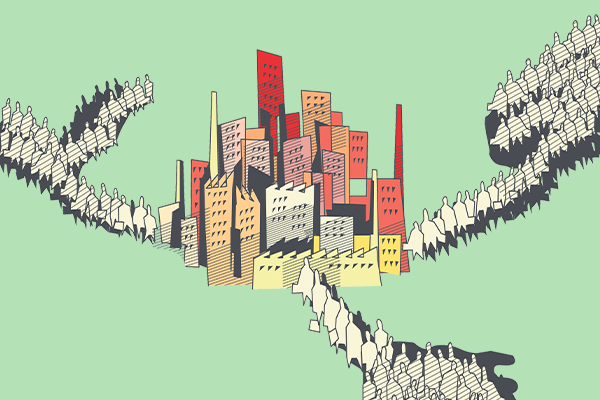OUR EYES MET as I walked up the concrete stairs from the Chicago Water Taxi’s Michigan Avenue stop. She held up a cardboard sign, her hand on a stroller with two young girls in puffy teal jackets inside.
Alejandra, as I’ll call her, had arrived in the city with her family two weeks earlier, after a grueling journey from Venezuela by bus, car, plane, and on foot through the Darién Gap. I couldn’t catch all the details in her rapid Spanish, but I understood she was staying at a nearby migrant shelter and that she wanted to find work to pay for her mother’s medical treatment back in Venezuela.
At the end of our conversation, I gave her all the cash I had; she asked if she could have my phone number. I gave it, but as I walked away, I wondered, “What have I gotten myself into?”
As a sanctuary city, Chicago has received over 51,000 migrants from the southern U.S. border since August 2022. The city recently decreased its new migrant services and merged its new migrant shelter system with its existing homeless shelter network. Immigrant rights activists worry that thousands will be left on the streets, increasingly leaving community organizations with the burden to help new migrants become self-sufficient.
Over the next weeks, Alejandra told me that her family had moved to a different shelter, one that was more crowded. She asked if I could front the first month’s rent for a place of their own, for help finding work, and for more money to pay her mom’s medical bills. Eventually, I reached the limit of how much I could help without becoming a full-fledged caseworker. I put Alejandra in touch with community groups. One contact told me, “We can’t do much. The resources are gone. [All] I have [is] information.”
Across the country, organizations that support migrants and refugees are reeling from federal policies and funding cuts eviscerating their programs. At the same time, experts forecast increases in climate-driven relocation, bringing more refugees knocking on the door of the United States, a country disproportionately responsible for climate emissions.
These compounding crises raise gnarly questions for Christ-followers. How can we embody the biblical call to “welcome the stranger” while not overlooking those who have been underserved in our neighborhoods for generations? What policies can we advocate for at local, state, and federal levels to protect the most vulnerable? What role can churches play to fill the gaps left by withdrawn government support?
Personally, I wrestle with the reality that I cannot, singlehandedly, help Alejandra and her family get on stable footing in a new country. They need a village. How can I honor my human limits while responding faithfully to Jesus’ words, “Give to the one who asks of you” (Matthew 5:42)? There are no easy answers, but I want to keep asking the question. I want to keep making eye contact with people on the street.

Got something to say about what you're reading? We value your feedback!






